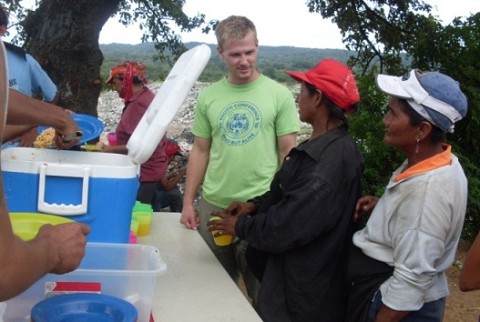

Missionary life can be comical
I’m in Nicaragua today. We’ve got a base down here that Charles “Carlitos” and Sarah Kaye started. My son Seth is down here discipling a group of young people (see his Thanksgiving pics with the dump people here).
Missionary life is full of missteps – times when our best efforts to communica…
By Seth Barnes
 I’m in Nicaragua today. We’ve got a base down here that Charles “Carlitos” and Sarah Kaye started. My son Seth is down here discipling a group of young people (see his Thanksgiving pics with the dump people here).
I’m in Nicaragua today. We’ve got a base down here that Charles “Carlitos” and Sarah Kaye started. My son Seth is down here discipling a group of young people (see his Thanksgiving pics with the dump people here).
Missionary life is full of missteps – times when our best efforts to communicate God’s love go awry. I was recently reminded of how ministering in a foreign country using the local idiom can produce comical results when I read J. Lee Grady’s article on his Spanish misadventures.
I’ve heard countless embarrassing stories of how Spanish
has been misused in sermons by American speakers, and some I can’t repeat here.
Once an evangelist visiting Peru exhorted an audience to lift their hands in
worship. He should have said, “¡Levante sus manos!” Instead he
exclaimed, “¡Levante sus monos!” which means, “Lift up your monkeys!” (I
am sure the worship was especially joyful that morning.)Once when I was in Venezuela with a group
of ministers, our hosts took one of the women speakers to a churrasquería,
a restaurant that specializes in piling your plate with multiple pounds of
grilled meats including lamb, beef, sausage, pork and chicken. When the lady
came back to the hotel I wanted to say, in Spanish, “You had a lot of meat.”
What I told her, in front of seven horrified friends, was that she was fat.
In some countries, calling a person “fat” can be a term of endearment. Call an overweight girl a “gordita,” and it can be like affectionately pinching her cheek. My coworker Erasmo always used to talk about how he wanted to marry a large gordita “She needs to be at least 200 pounds so she could protect me,” he’d say. He married a pastora (a lady pastor) instead. I’m sure she’s doing a fine job of protecting Erasmo.
I remember a time when a friend of mine working in Mexico tried to ask a 13 year-old girl if she was hungry. What he should have said was, “Tienes hambre?” What he said instead was, “Tienes hombre?” Which means, “Do you have a man?” She looked at him in shock, not knowing what to say.
In English, we would call such instances embarrassing. But even communicating that concept in Spanish has compounded the awkwardness. On several occasions I’ve watched people try to explain how embarrassed they were. “Estoy muy embarassada,” they exclaimed, which, when translated, means “I’m very pregnant.”
Ministering cross-culturally is fraught with land mines, big and small. If you’re called to it, failing is a part of the job description. The only way to cope is to make sure your sense of humor is an essential part of your packing list.



Hilarious. The “tienes hombre” one is pretty typical… Gets on my nerves like fingernails on a chalkboard.
This made me smile and chuckle. I speak very basic Spanish, and remeber being in Honduras both saying things that didn’t translate the way I thought, and having things said to me that culturally meant something different than what I was taught in Spanish 101.
I suppose it’s something we(and I mean me) need to learn in all areas. Laughter is an essential tool in life, stop being so serious all the time.
Yeah, the kids at the orphanage in Tijuana we visit had to correct me once. I meant to ask in Spanish, “How old are you?” But instead I asked, “How many anuses do you have?”
i once accidentally told a kid jesus didn’t love him anymore. had to do a little bit of repair work with that one.
My friend preached on Acts 2:38 finalizing by inviting everyone to “Repent and be baptized for the forgiveness of the fish!” Pecados= Sins and pescados= Fish
People didn’t respond but just looked at each other in amazement.Those who started to respond sat back down. Uggg
Ok…to many to tell here and my own I keep secret. blessings. Headed to Mexico Dec.14-18…you are invited to pray.
Wayne Gaines@ M300 Ministries
Oh yeah! I have tons of stories of what I call “Spanish fail.” But what I’ve found is that people in Latin America appreciate our trying to speak Spanish and are incredibly patient with our missteps. We can all laugh and it makes things interesting.
Thank you for sharing these adventures! It reminds me of another aspect of missions for which to pray. 🙂
This reminds me of my mixed up communication with our taxi driver in Nicaragua. I was trying to ask him if he wanted an orange that I had left over, but instead, as I was told later by my teammates, I said something more to the effect of I want you. Which explained the awkward expression and the hesitancy to receive the orange. Oops!
Love it!
I was in Peru a few years ago and the team and I had to introduce ourselves in front of the church. One of my teammates wanted to convey how gracious and generous the Peruvians had been, so she stood up in front of the church and said very sincerely “ustedes son muy graciosos” (you’re very funny!) They all laughed politely which she took as modesty and insisted “Si, si!” at which point they probably started thinking she was a bit rude!
The other classic is a line of a worship song which goes “grandes son tus obras” (great are your works) at which one member of my team used to sing “grandes son tus sobres” (large are your envelopes!). We did it deliberately from then on….
Good times!